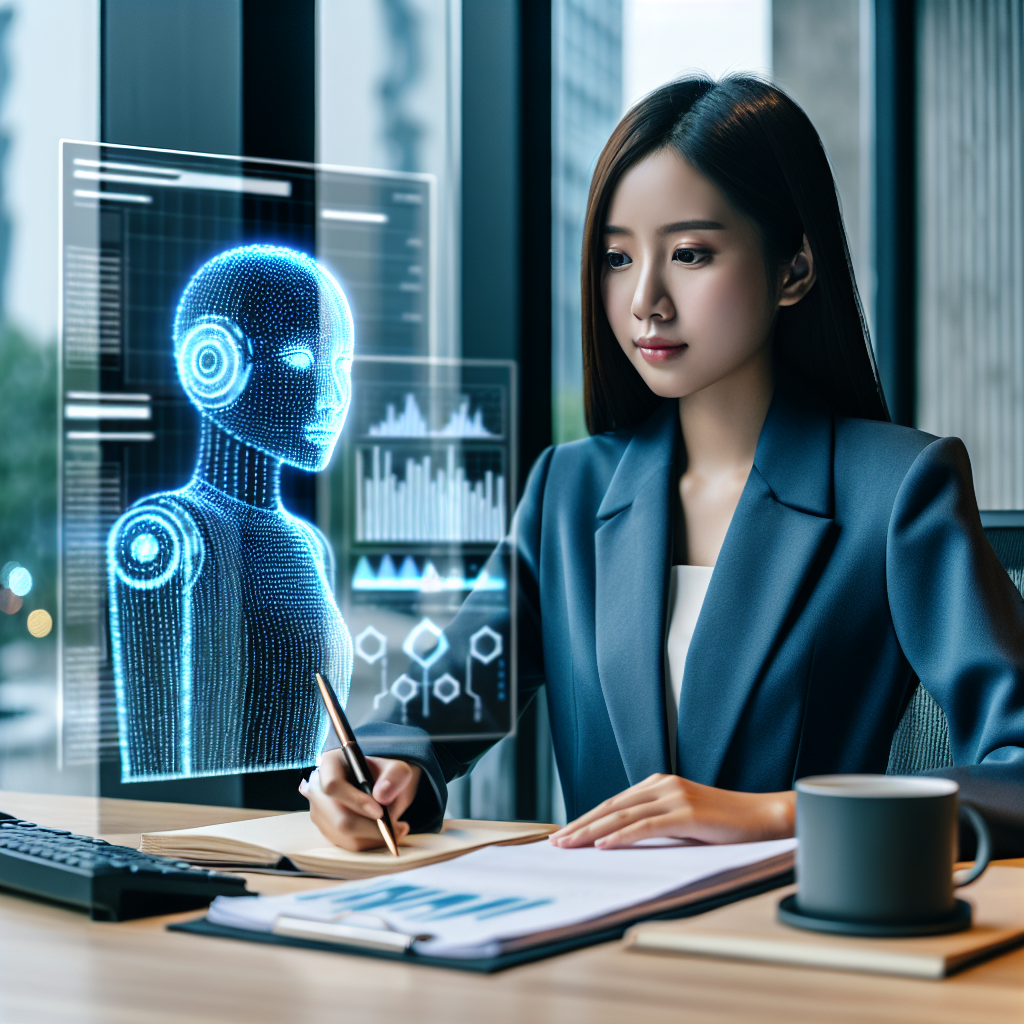Artificial intelligence (AI) is becoming more common in the field of accountancy. It helps with tasks that are boring and take a long time to do. Trainee accountants, like Owen Hewitt, think that AI can take over tasks like looking at financial data. This would let humans focus on more interesting things, like deciding if a business is good or predicting if someone can pay back their debt. AI can learn from data and make predictions, but it can’t replace humans when it comes to making decisions based on different things.
AI is really helpful for tasks like summarizing documents, creating content, searching for things, analyzing data, and managing knowledge. These tasks are usually done by junior accountants. But some people worry that using AI a lot could mean that some people lose their jobs, especially in auditing, which doesn’t make a lot of money. A survey by KPMG found that 40% of senior auditors think that AI will mean smaller audit teams. Some tasks in auditing have already been given to people in other countries, and junior accountants will need to focus more on working with clients.
Because of this, training programs are changing to include AI and data science skills. Auditing firms are being watched because they’ve made some big mistakes, and they’re using AI to fix their problems. AI can help auditors by looking at lots of data, figuring out risks better, and finding things that are strange in big sets of data. It can also help auditors focus on the hard and risky parts of their job. AI might also help keep people in auditing, because it can do the boring tasks and let auditors focus on thinking and understanding.
In the end, AI can make accountancy better by doing boring tasks and letting accountants do more interesting things. But using AI also means that some people might lose their jobs, and accountants will need to learn new skills, like data science and working with clients.
Original news source: Could AI take the grind out of accountancy? (BBC)
🎧 Listen:
Slow
Normal
Fast
📖 Vocabulary:
| 1 | accountancy | The job of keeping and checking financial records, calculating taxes, and providing financial advice |
| 2 | artificial intelligence | Technology that allows computers to learn from experience, adjust to new inputs, and perform human-like tasks |
| 3 | trainee | A person who is being trained for a job |
| 4 | financial | Related to money and how it is managed |
| 5 | predictions | Statements about what will happen in the future based on information or knowledge |
| 6 | summarizing | Making a long piece of writing shorter, giving only the important information |
| 7 | content | The information or material created for people to read or watch |
| 8 | auditing | Checking financial records to make sure they are correct |
| 9 | survey | A study where people are asked for their opinions about a subject |
| 10 | data science | The study of complex data and how to analyze it to make decisions |
| 11 | risks | Possible dangers or problems |
| 12 | clients | People or organizations that use the services of a professional |
| 13 | junior accountants | People who are at the beginning of their careers in a profession |
| 14 | firms | Businesses or organizations that offer a particular service |
| 15 | skills | The abilities and knowledge that you need to do something well |
Group or Classroom Activities
Warm-up Activities:
– News Summary
Instructions: Divide the class into pairs or small groups. Have each group read the article and summarize it in their own words. Then, ask each group to share their summaries with the class. Encourage discussion and comparison of the different summaries.
– Opinion Poll
Instructions: Have the class form small groups. Ask each group to come up with a question related to the article, such as “Do you think AI will replace human accountants in the future?” or “Do you think AI is more helpful or harmful in the field of accountancy?” Each group should then conduct a mini opinion poll within the class, asking other students to share their opinions on the question. After collecting the responses, each group can present their findings to the class.
– Vocabulary Pictionary
Instructions: Create a list of key vocabulary words from the article, such as “artificial intelligence,” “auditing,” “data science,” etc. Divide the class into pairs or small groups. Give each group a vocabulary word and ask them to draw a picture that represents the word. The other groups must then guess the word based on the drawing. Encourage students to use the words in sentences as they guess.
– Pros and Cons
Instructions: Divide the class into pairs or small groups. Ask each group to discuss and list the pros and cons of using AI in the field of accountancy. After a designated amount of time, have each group share their lists with the class. Encourage students to explain their reasoning and engage in a class discussion about the potential benefits and drawbacks of AI in this context.
– Future Predictions
Instructions: Have the class form small groups. Ask each group to discuss and make predictions about the future of AI in the field of accountancy. They should consider how AI could impact the job market, the skills needed by accountants, and the overall role of accountants in the industry. After a designated amount of time, each group can present their predictions to the class. Encourage students to support their predictions with evidence from the article or their own reasoning.
🤔 Comprehension Questions:
1. What is one way that AI is helpful in the field of accountancy?
2. According to the article, what are some tasks that AI can do for accountants?
3. Why are some people worried about the use of AI in auditing?
4. What percentage of senior auditors believe that AI will lead to smaller audit teams?
5. How are training programs changing to adapt to the use of AI in accountancy?
6. Why are auditing firms using AI to fix their problems?
7. How can AI help auditors in their job?
8. What are some potential benefits and drawbacks of using AI in accountancy?
Go to answers ⇩
🎧✍️ Listen and Fill in the Gaps:
Artificial intelligence (AI) is becoming more (1)______ in the field of accountancy. It helps with tasks that are boring and take a long time to do. Trainee accountants, like Owen Hewitt, think that AI can take over tasks like looking at financial data. This would let humans focus on more interesting (2)______, like deciding if a business is good or (3)______ if someone can pay back their debt. AI can learn from data and make predictions, but it can’t (4)______ humans when it comes to making decisions based on different things.
AI is really helpful for (5)______ like summarizing documents, creating content, searching for things, (6)______ data, and managing knowledge. These tasks are usually done by junior (7)______. But some people worry that using AI a lot could mean that some people lose their jobs, especially in auditing, which doesn’t make a lot of money. A survey by KPMG found that 40% of senior auditors (8)______ that AI will mean smaller audit teams. Some tasks in auditing have already been given to people in other countries, and junior accountants will need to focus more on working with clients.
Because of this, training programs are changing to include AI and data science skills. Auditing firms are being (9)______ because they’ve made some big mistakes, and they’re (10)______ AI to fix their problems. AI can help (11)______ by looking at lots of data, (12)______ out risks better, and finding things that are strange in big sets of data. It can also help auditors focus on the hard and (13)______ parts of their job. AI might also help keep (14)______ in auditing, because it can do the boring tasks and let auditors focus on thinking and understanding.
In the end, AI can make accountancy better by (15)______ boring tasks and (16)______ accountants do more interesting things. But using AI also means that some people might lose their jobs, and accountants will need to learn new skills, like data science and working with clients.
Go to answers ⇩
💬 Discussion Questions:
Students can ask a partner these questions, or discuss them as a group.
1. What is artificial intelligence and how is it being used in the field of accountancy?
2. How do you think AI can help accountants in their work?
3. Do you think AI will replace humans in making important decisions in accountancy? Why or why not?
4. How would you feel if AI took over tasks like looking at financial data and humans only focused on making decisions? Why?
5. Do you think using AI in accountancy could lead to job loss for some people? Why or why not?
6. Why do some people worry about the use of AI in auditing?
7. How are training programs for accountants changing to include AI and data science skills?
8. Why are auditing firms being watched and how can AI help them fix their problems?
9. How can AI help auditors in their work?
10. Do you think AI can help keep people in auditing? Why or why not?
11. How can AI make accountancy better for accountants?
12. What are some skills that accountants will need to learn in order to work with AI?
13. How do you think the use of AI will impact the future of accountancy?
14. How do you feel about the increasing use of AI in different industries, including accountancy? Why?
15. Do you think AI will eventually replace humans in most jobs? Why or why not?
Individual Activities
📖💭 Vocabulary Meanings:
Match each word to its meaning.
Words:
1. accountancy
2. artificial intelligence
3. trainee
4. financial
5. predictions
6. summarizing
7. content
8. auditing
9. survey
10. data science
11. risks
12. clients
13. junior accountants
14. firms
15. skills
Meanings:
(A) A person who is being trained for a job
(B) Related to money and how it is managed
(C) People who are at the beginning of their careers in a profession
(D) Businesses or organizations that offer a particular service
(E) Statements about what will happen in the future based on information or knowledge
(F) The abilities and knowledge that you need to do something well
(G) People or organizations that use the services of a professional
(H) Checking financial records to make sure they are correct
(I) Making a long piece of writing shorter, giving only the important information
(J) The study of complex data and how to analyze it to make decisions
(K) The information or material created for people to read or watch
(L) Technology that allows computers to learn from experience, adjust to new inputs, and perform human-like tasks
(M) A study where people are asked for their opinions about a subject
(N) The job of keeping and checking financial records, calculating taxes, and providing financial advice
(O) Possible dangers or problems
Go to answers ⇩
🔡 Multiple Choice Questions:
1. What is one way that AI can help accountants?
(a) By making decisions based on different things
(b) By predicting if someone can pay back their debt
(c) By taking over tasks that are boring and time-consuming
(d) By replacing humans in making decisions
2. What tasks are usually done by junior accountants that AI can help with?
(a) Making decisions based on different things
(b) Predicting if someone can pay back their debt
(c) Taking over tasks that are boring and time-consuming
(d) Summarizing documents, creating content, searching for things, analyzing data, and managing knowledge
3. What percentage of senior auditors think that AI will result in smaller audit teams?
(a) 40%
(b) 60%
(c) 20%
(d) 80%
4. Why are training programs for accountants changing?
(a) To focus more on working with clients
(b) To replace auditors with AI
(c) To include AI and data science skills
(d) To make accountancy more interesting
5. How can AI help auditors in their job?
(a) By predicting if someone can pay back their debt
(b) By making decisions based on different things
(c) By replacing auditors in their job
(d) By looking at lots of data, figuring out risks better, and finding things that are strange in big sets of data
6. What is one concern people have about using AI in accountancy?
(a) Accountants will need to learn new skills, like data science and working with clients
(b) Some people might lose their jobs
(c) AI can’t replace humans when it comes to making decisions
(d) AI might make accountancy more interesting
7. What is one way AI can make accountancy better?
(a) By doing boring tasks and letting accountants do more interesting things
(b) By predicting if someone can pay back their debt
(c) By replacing humans in making decisions
(d) By taking over tasks that are boring and time-consuming
8. What skills will accountants need to learn in order to adapt to AI?
(a) Making decisions based on different things
(b) Data science and working with clients
(c) Predicting if someone can pay back their debt
(d) None of the above
Go to answers ⇩
🕵️ True or False Questions:
1. Artificial intelligence (AI) is being used less in the field of accountancy to help with boring and time-consuming tasks.
2. Trainee accountants believe that AI cannot take over tasks like analyzing financial data, allowing humans to focus on less interesting aspects of their job.
3. A survey by KPMG found that 60% of senior auditors believe that AI will result in larger audit teams.
4. AI can help auditors by analyzing large amounts of data, identifying risks more effectively, and detecting anomalies.
5. AI can learn from data and make predictions, but it cannot replace humans when it comes to making decisions based on different factors.
6. Some people are concerned that the increased use of AI in accountancy could lead to job losses, particularly in the auditing sector.
7. AI is unhelpful for tasks like summarizing documents, creating content, searching for information, analyzing data, and managing knowledge, which are usually done by senior accountants.
8. Training programs in accountancy are now including AI and data science skills to adapt to the changing industry.
Go to answers ⇩
📝 Write a Summary:
Write a summary of this news article in two sentences.
Check your writing now with the best free AI for English writing!
Writing Questions:
Answer the following questions. Write as much as you can for each answer.
Check your answers with our free English writing assistant!
1. What is one way that artificial intelligence (AI) can help accountants?
2. According to the article, what are some tasks that AI is helpful for in the field of accountancy?
3. What are some concerns that people have about the use of AI in auditing?
4. How can AI help auditors in their job?
5. What are some skills that accountants will need to learn in order to adapt to the use of AI?
✅ Answers
🤔✅ Comprehension Question Answers:
1. One way that AI is helpful in the field of accountancy is by automating tasks that are boring and time-consuming.
2. According to the article, AI can help accountants with tasks such as summarizing documents, creating content, searching for information, analyzing data, and managing knowledge.
3. Some people are worried about the use of AI in auditing because they believe it could lead to job losses, especially in the auditing sector which is not very profitable.
4. According to a survey by KPMG, 40% of senior auditors believe that AI will result in smaller audit teams.
5. Training programs are changing to include AI and data science skills to adapt to the use of AI in accountancy.
6. Auditing firms are using AI to fix their problems because they have made significant mistakes in the past and AI can help improve risk assessment, identify anomalies in large datasets, and allow auditors to focus on more complex tasks.
7. AI can help auditors in their job by analyzing large amounts of data, improving risk assessment, identifying anomalies, and automating repetitive tasks, thus allowing auditors to focus on more challenging and critical aspects of their work.
8. Some potential benefits of using AI in accountancy include increased efficiency, improved accuracy, and the ability to handle large amounts of data. However, there are also concerns about job losses and the need for accountants to acquire new skills to adapt to the changing landscape of the profession.
Go back to questions ⇧
🎧✍️✅ Listen and Fill in the Gaps Answers:
(1) common
(2) things
(3) predicting
(4) replace
(5) tasks
(6) analyzing
(7) accountants
(8) think
(9) watched
(10) using
(11) auditors
(12) figuring
(13) risky
(14) people
(15) doing
(16) letting
Go back to questions ⇧
📖💭✅ Vocabulary Meanings Answers:
1. accountancy
Answer: (N) The job of keeping and checking financial records, calculating taxes, and providing financial advice
2. artificial intelligence
Answer: (L) Technology that allows computers to learn from experience, adjust to new inputs, and perform human-like tasks
3. trainee
Answer: (A) A person who is being trained for a job
4. financial
Answer: (B) Related to money and how it is managed
5. predictions
Answer: (E) Statements about what will happen in the future based on information or knowledge
6. summarizing
Answer: (I) Making a long piece of writing shorter, giving only the important information
7. content
Answer: (K) The information or material created for people to read or watch
8. auditing
Answer: (H) Checking financial records to make sure they are correct
9. survey
Answer: (M) A study where people are asked for their opinions about a subject
10. data science
Answer: (J) The study of complex data and how to analyze it to make decisions
11. risks
Answer: (O) Possible dangers or problems
12. clients
Answer: (G) People or organizations that use the services of a professional
13. junior accountants
Answer: (C) People who are at the beginning of their careers in a profession
14. firms
Answer: (D) Businesses or organizations that offer a particular service
15. skills
Answer: (F) The abilities and knowledge that you need to do something well
Go back to questions ⇧
🔡✅ Multiple Choice Answers:
1. What is one way that AI can help accountants?
Answer: (c) By taking over tasks that are boring and time-consuming
2. What tasks are usually done by junior accountants that AI can help with?
Answer: (d) Summarizing documents, creating content, searching for things, analyzing data, and managing knowledge
3. What percentage of senior auditors think that AI will result in smaller audit teams?
Answer: (a) 40%
4. Why are training programs for accountants changing?
Answer: (c) To include AI and data science skills
5. How can AI help auditors in their job?
Answer: (d) By looking at lots of data, figuring out risks better, and finding things that are strange in big sets of data
6. What is one concern people have about using AI in accountancy?
Answer: (b) Some people might lose their jobs
7. What is one way AI can make accountancy better?
Answer: (a) By doing boring tasks and letting accountants do more interesting things
8. What skills will accountants need to learn in order to adapt to AI?
Answer: (b) Data science and working with clients
Go back to questions ⇧
🕵️✅ True or False Answers:
1. Artificial intelligence (AI) is being used less in the field of accountancy to help with boring and time-consuming tasks. (Answer: False)
2. Trainee accountants believe that AI cannot take over tasks like analyzing financial data, allowing humans to focus on less interesting aspects of their job. (Answer: False)
3. A survey by KPMG found that 60% of senior auditors believe that AI will result in larger audit teams. (Answer: False)
4. AI can help auditors by analyzing large amounts of data, identifying risks more effectively, and detecting anomalies. (Answer: True)
5. AI can learn from data and make predictions, but it cannot replace humans when it comes to making decisions based on different factors. (Answer: True)
6. Some people are concerned that the increased use of AI in accountancy could lead to job losses, particularly in the auditing sector. (Answer: True)
7. AI is unhelpful for tasks like summarizing documents, creating content, searching for information, analyzing data, and managing knowledge, which are usually done by senior accountants. (Answer: False)
8. Training programs in accountancy are now including AI and data science skills to adapt to the changing industry. (Answer: True)
Go back to questions ⇧















